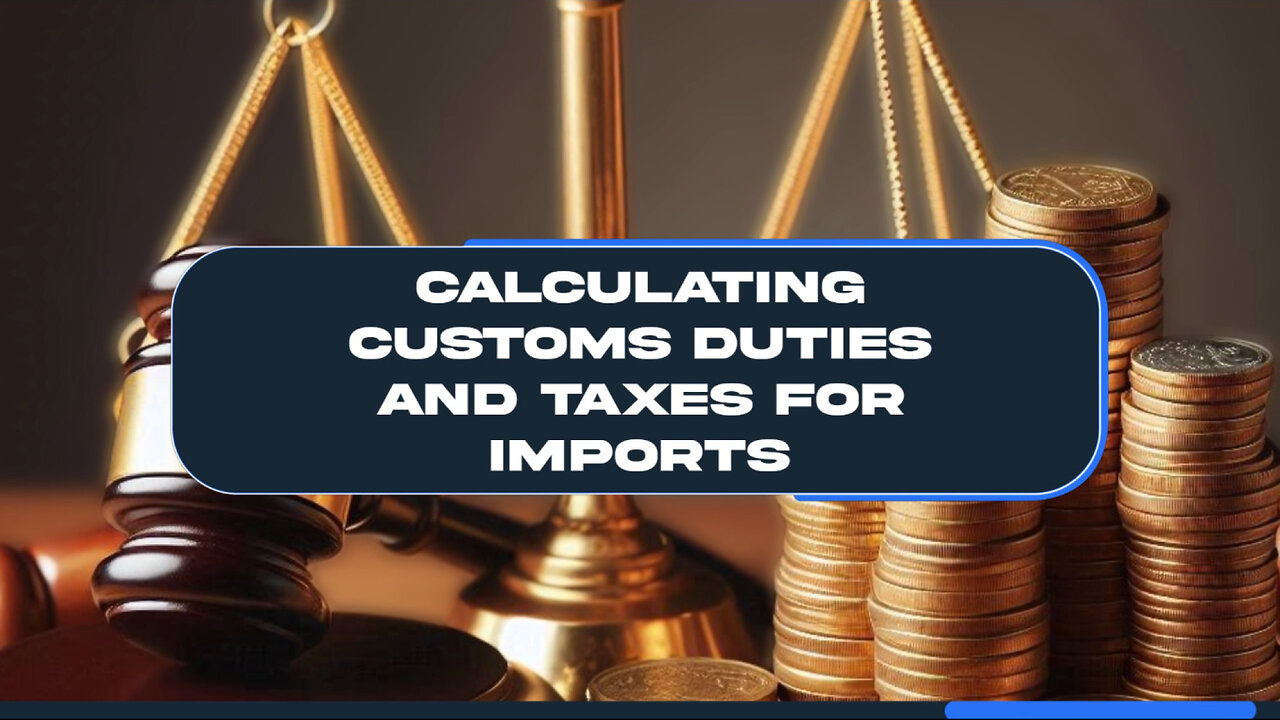Premium Only Content

Navigating Customs: The Secrets to Calculating Duties and Taxes for Imports
ISF Checklist || 805-970-7918 || contact@isfchecklist.com || www.isfchecklist.com
In today's video, we explored the topic of calculating customs duties and taxes for imports. These fees are imposed by the government to regulate trade and protect domestic industries. The amount of duties and taxes depend on factors such as the value of the goods, country of origin, product classification, and any trade agreements in place.
To calculate customs duties and taxes, it is necessary to determine the customs value of the imported goods, which includes the cost of the goods, insurance, and freight charges. Once the customs value is determined, the applicable customs tariff rate can be applied, which varies based on the product and the importing country.
Customs duty calculators are useful tools for estimating duties and taxes. These tools allow you to enter the details of your imported goods and receive an estimate of the applicable fees. However, it's important to note that these calculators are for guidance purposes only and the final amount may vary based on customs inspections and other factors.
As customs brokers, our role goes beyond calculating these fees. We also ensure compliance with customs regulations by preparing and submitting the necessary documents, such as customs entries or declarations, on behalf of the importer. We work closely with our clients to accurately assess customs values, determine tariff classifications, and apply any applicable duty exemptions or trade rates.
It is crucial for importers to carefully review the breakdown of customs duties and taxes to avoid overpayment or underpayment, which could result in penalties or delays in the clearance process. As customs brokers, we provide our clients with a detailed breakdown of these fees, ensuring they understand what needs to be paid and why.
A customs bond is also an important consideration when importing goods. It serves as a guarantee to customs authorities that all duties, taxes, and other obligations will be paid correctly. The amount of the bond depends on factors such as the value of the goods and the importer's compliance history. Customs bonds can be obtained from a surety bond provider.
Lastly, we discussed the Importer Security Filing (ISF), which is required for all shipments entering the United States by ocean vessel. The ISF is an electronic filing that must be submitted to the US Customs and Border Protection at least 24 hours before the vessel's departure. Failure to comply with ISF requirements can result in penalties and delays in cargo release.
In conclusion, calculating customs duties and taxes for imports is a complex process that requires expertise and attention to detail. Working with experienced customs brokers can ensure compliance, minimize costs, and facilitate smooth and efficient customs clearance.
#usimportbond #isfcustomsbroker #uscustomsclearing #isfentry
Video Disclaimer Here: This video is purely educational and has no ties with the US government.
-
 7:32
7:32
CoachTY
12 hours ago $9.38 earnedWHALES ARE BUYING AND RETAIL IS SELLING. THIS IS WHY PEOPLE STAY BROKE!!!
61.9K8 -
 1:01:00
1:01:00
Talk Nerdy 2 Us
9 hours ago💻 From ransomware to global regulations, the digital battlefield is heating up!
27.1K -
 3:00:24
3:00:24
I_Came_With_Fire_Podcast
12 hours agoHalf the Gov. goes MISSING, Trump day 1 Plans, IC finally tells the Truth, Jesus was NOT Palestinian
51.5K26 -
 4:11:49
4:11:49
Nerdrotic
14 hours ago $36.69 earnedThe Best and Worst of 2024! Sony Blames Fans | Batman DELAYED | Nosferatu! |Friday Night Tights 334
179K32 -
 7:55:51
7:55:51
Dr Disrespect
18 hours ago🔴LIVE - DR DISRESPECT - WARZONE - SHOTTY BOYS ATTACK
229K32 -
 1:30:23
1:30:23
Twins Pod
17 hours agoHe Went From MARCHING With BLM To Shaking Hands With TRUMP! | Twins Pod - Episode 45 - Amir Odom
141K31 -
 1:02:30
1:02:30
Exploring With Nug
19 hours ago $4.20 earned2 Duck Hunters Missing After Kayak Capsizes!
66.2K4 -
 46:48
46:48
Mally_Mouse
12 hours agoLet's Hang!! -- Opening Christmas gifts from YOU!
74.4K1 -
 44:55
44:55
Athlete & Artist Show
20 days ago $2.07 earnedNHL 4 Nations Snubs, Was Hawk Tuah Coin A Scam?
71.1K -
 33:47
33:47
Stephen Gardner
18 hours ago🔥Pentagon Whistleblower UNLEASHES on Biden and Obama!
127K283